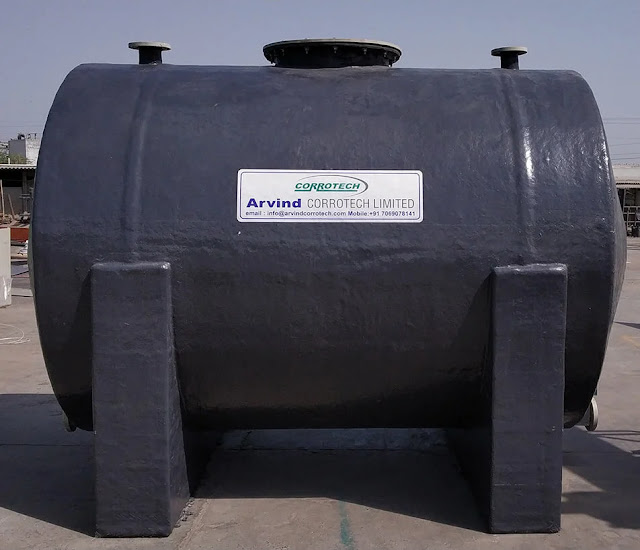In the world of industrial storage and processing, the need for durable, corrosion-resistant, and cost-effective solutions is more important than ever. PP FRP tanks have emerged as a preferred choice across a variety of industries for their outstanding performance in harsh chemical environments. These tanks combine the strength of fiber-reinforced plastic (FRP) with the chemical resistance of polypropylene (PP), offering the best solution for storing acids, alkalis, water, and other industrial fluids.
Why Choose PP FRP Tanks from Arvind Corrotech?
At Arvind Corrotech, we specialize in designing and manufacturing high-performance PP FRP tanks customised to your specific industrial requirements. Our tanks are made using high-quality raw materials, advanced technology, and strict quality control processes. Whether you require vertical storage for chemicals, custom pickling tanks for galvanizing lines, or modular tanks for limited spaces, we offer complete solutions including design, fabrication, installation, and after-sales customer support.
We’ll explore what PP FRP tanks are, their key types, common applications, and why they are globally used in multiple industries. PP FRP tanks are composite storage containers constructed using an inner layer of polypropylene (PP) for rust proofing and an outer layer of fiber-reinforced plastic (FRP) for structural strength. This multi-layer construction provides the best of both worlds: the best chemical compatibility and mechanical properties.
PP (Polypropylene) is a thermoplastic polymer known for its resistance to chemical attack.FRP (Fiber Reinforced Plastic) is a composite material made from glass fibers and resin, which adds hardness, strength, and impact resistance.These tanks are basically custom-designed to fit the specific requirements of multiple industrial operations and can be made in vertical, horizontal, or rectangular configurations.
Types of PP FRP Tanks
PP FRP tanks come in several types depending on the application and design specifications:
1. Vertical Storage Tanks
These vertical storage tanks are the most common type of PP FRP tanks, used for storing liquids in a stationary, upright position. They are mainly the best choice where space is limited and for small units.
2. Horizontal Tanks
Mounted horizontally on saddles or skids, these tanks are the best choice for mobile or ground-level applications and are mainly used in transportation or dosing systems.
3. Rectangular Tanks
Designed for modular spaces and custom processing setups, rectangular PP FRP tanks are popular in plating and electroplating industries.
4. Pickling Tanks
These pickling tanks are specialized rectangular tanks used primarily in the galvanizing and steel processing industries for pickling processes, where metal is treated with acid solutions to remove scale and rust.
5. Chemical Dosing Tanks
Used for accurate dosing and mixing of chemicals, these tanks are designed to withstand aggressive substances and ensure safe handling.
Key Features and Advantages
PP FRP tanks are engineered for long-term reliability and low maintenance. Here are the core advantages:
- Rust-proof: The inner PP layer resists acids, alkalis, solvents, and salts.
- Longevity: The FRP outer shell ensures mechanical strength and impact resistance.
- Customizability: Can be manufactured in various sizes, shapes, and configurations.
- Lightweight: Easier to transport and install compared to metal tanks.
- Thermal Resistance: Handles a large range of operating temperatures.
- Low Maintenance: Requires less upkeep due to high durability.
Applications of PP FRP Tanks
PP FRP tanks are used across multiple sectors that require the safe handling and storage of reactive or sensitive materials. Here are some of the most common applications:
1. Chemical Processing
Used for storing and mixing acids, solvents, and other aggressive chemicals. Their non-reactive surfaces help maintain purity and safety.
2. Water Treatment
From industrial effluent management to municipal water treatment plants, PP FRP tanks are ideal for handling chemicals like chlorine, alum, and lime.
3. Electroplating & Surface Treatment
These tanks are widely used in electroplating, anodizing, and metal finishing industries where chemical baths are required.
4. Pharmaceutical & Food Industries
Their hygienic and non-reactive surfaces make them suitable for pharmaceutical solutions and certain food processing tasks.
5. Textile & Dyeing
Used for dye storage and chemical treatment of fabrics in textile units due to their resistance to chemical dyes and acids.
6. Power & Energy Sector
In power plants, these tanks store water treatment chemicals, cooling agents, or acidic cleaning agents used during maintenance operations.
Final Thoughts
PP FRP tanks offer a safe, quality, and long-lasting solution for storing and processing a variety of industrial chemicals and fluids. Their dual-layer construction ensures chemical resistance and mechanical strength, making them a best and meaningful investment for any industrial setup. As industries highly demand productive and rust-proof storage solutions, PP FRP tanks have become the best choice, thanks to their smooth performance, range, and affordable cost.







